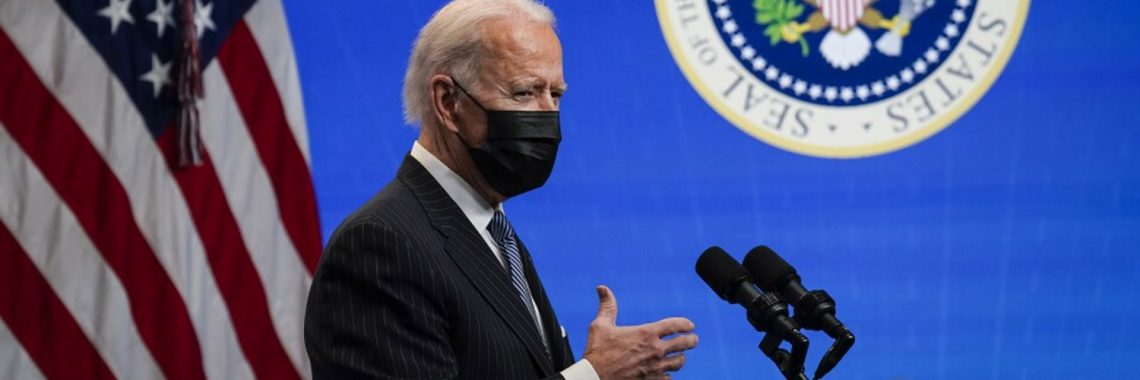
Whether President Joe Biden’s Buy American executive order gets government contractors to comply with supply source rules could depend on how bold whistleblowers are and how aggressively the Justice Department relies on the False Claims Act, attorneys say.
Contractors are going to have to revisit their supply chain and sourcing practices to comply with enhanced domestic preference requirements in light of the Jan. 25 executive order that seeks to increase federal agencies’ purchases of U.S. products, said Margaret M. Cassidy of Cassidy Law in Washington and Cleveland.
“The only way these efforts have teeth is for the government to enforce these requirements when contractors fail to comply,” Cassidy said. “The biggest stick the government has, the False Claims Act, is used when a contractor sells non-domestic products to the U.S. government.”
Biden’s order makes it harder for the federal government to obtain waivers to purchase products from overseas and directs agencies to seek out U.S. companies to supply goods.
It directs the Federal Acquisition Regulatory Council to finalize rules that would tighten standards defining American-made products and creates a Made in America Director, under the Office of Management and Budget, to oversee compliance waivers.
Is the Claim False?
The government considers a contractor to be making a “false claim” when the contractor represents it is selling domestic product to the government but in fact isn’t, Cassidy said. The argument has been recently used to accuse office product and information technology suppliers of defrauding the government.
Biden’s declaration that “Buy America” is U.S. policy, and that government purchases of products from China violate that policy, may increase how aggressively the U.S. enforces the domestic-sourcing directive, said H. Vincent McKnight Jr., who represents FCA whistleblowers at Sanford Heisler Sharp LLP in Washington.
Under the Buy American Act, federal agencies can only purchase articles produced in the U.S. The Trade Agreements Act provides exceptions, allowing the president to designate specific countries that can provide goods sold to agencies.
While China hasn’t been one of those excepted countries, the government has nonetheless backed away from TAA enforcement related to its products because contractors in FCA litigation successfully demonstrated that government procurement officials knew, or should have known, that such products were routinely purchased, he said.
The U.S. Supreme Court discussed when noncompliance with a contract requirement could trigger FCA liability in Universal Health Servs. Inc. v. United States ex rel. Escobar. The court arguably provided contractors with a materiality defense to FCA cases—they could say a case fails for lack of materiality because the government kept making contract payments despite knowledge of noncompliance or misconduct.
“Under Escobar, if the government was in the habit of buying products from non-designated countries like China, then enforcing the TAA was not ‘material’ to the government and could not constitute fraud. Or so the argument goes,” McKnight said.
“No one will admit it on the record, but the U.S. has been buying hundreds of millions of dollars of Chinese products each year,” he said.
Whether that changes remains to be seen. FCA Buy American cases, whether involving Chinese or other countries’ products, have been rare, though not unheard of.
McKnight, for example, represented a whistleblower in an FCA case accusing an office supply company of unlawfully selling Chinese-made paper shredders to the government through a General Services Administration website. The case ended in a settlement in 2019.
Behind the Curtain
Contracting officers “have been loathe” to look behind a contractor’s representation or certification of compliance, said Merle M. DeLancey Jr., who represents contractors at Blank Rome LLP, Washington.
With respect to establishing materiality under Escobar, they will have to add language to requests for proposals stating explicitly that BAA compliance is material to the government’s decision to award contracts and pay, he said.
If the Biden administration is serious about strengthening the BAA and implementing the executive order enforcement, it will have to rely on whistleblowers, who have the insider knowledge to report fraud, said David Colapinto of Kohn, Kohn & Colapinto LLP in Washington, a law firm that represents whistleblowers.
“A lot will depend on how strong the new regulations are written to require government contractors to certify that they are complying with these Buy American provisions as a condition of obtaining a government contract, and also closing the waivers and loopholes so the certifications are meaningful,” he said.
FCA recoveries from alleged noncompliance don’t occur with great frequency, but on Jan. 12, Raytheon and a subsidiary agreed to pay $515,000 to resolve claims it improperly sold goods from Romania to the government.
Medical supplies company Ambu agreed to a $3.3 million settlement for allegedly manufacturing products in China and Malaysia for sale to the Defense Logistics Agency in 2019.
An active case in a California federal court involves claims that an office products supplier violated the FCA by providing the government with parts made by Chinese technology company Huawei Technologies Co. Ltd.
More of the Same?
The extent to which the Biden administration is successful in enforcing Buy American rules depends on future action, but there is already cause for some doubt as to how much will actually change.
Jennifer Schaus of Schaus & Associates, a federal contracting consultant, said the requirement that agencies scout for new businesses really “is a friendly reminder on how to do their job” and “redundant” to market research requirements in the Federal Acquisition Regulation.
“The appointment of the Made In America ‘czar’ is just another level of bureaucracy and adds to ‘big government.’ It may sound good and look good on paper for marketing and PR purposes which may or may not impact results,” she said.
But the Biden administration could provide transparency and clarity on Buy American compliance by requiring agencies to issue report cards the way they do for small business set-aside contracting goals, she added.
It’s nearly impossible for agencies to monitor every vendor to enforce compliance, said Jack Coley, president and CEO of Coley GCS LLC in San Antonio.
Enforcement has historically fallen “on the shoulders of government vendors and their employees to report suspected violations. It is in a vendor’s interest to ensure their competitors are competing on a level playing field and in my experience this enforcement approach has worked well,” he said.

